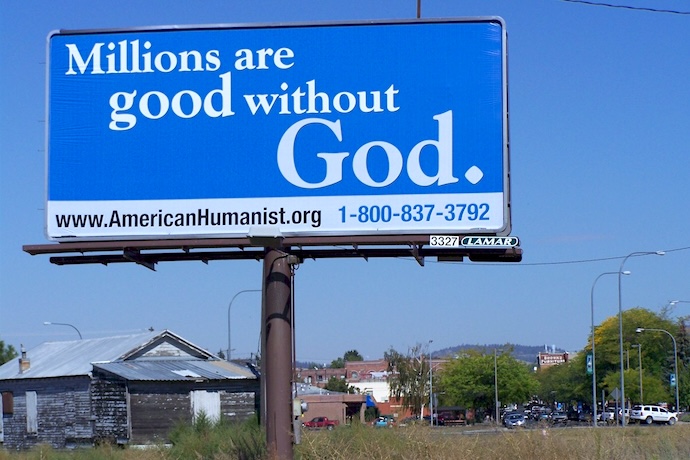It’s a story that can inspire even the most cynical among us. A person endures some difficult trial, such as an illness, injury, or other calamity. At their lowest point, they call to the divine. And through the darkness they discern a voice, either speaking directly or providing signs for where to go next. Once the ordeal has passed, the person is changed forever, with a newfound faith—or a restored one.
A variation of this story can be found everywhere. Parents share it with children. Clergy share it with their flock. Politicians make it part of their campaigns. Understandably, the story carries with it a gravely serious tone. It’s not merely an anecdote. It is, instead, a testimony closely tied to a person’s identity, their sense of hope, purpose, morality, and meaning. To criticize that narrative, or even to question it, could be interpreted as offensive, even bigoted.
But there’s a similar story that’s being told with more frequency than ever before, and it runs in the opposite direction. In this version, a person goes through a similar period of reflection, sometimes (but not always) spurred by hardship or challenge. They come out the other side with no need for what we often refer to as “faith.” They may adopt different labels—agnostic, atheist, unaffiliated, none, done—but the result is something that was previously unthinkable for them.
Some deconversions are quite dramatic. Like the archaeology student who discovers how little evidence there is to support the scriptures they were raised to believe in. Or the feminist studies undergrad whose research puts them at odds with the clergy of their youth, and who concludes that no single authority “owns” a tradition. Or the caretaker witnessing a loved one die of a terminal illness who comes to accept that there’s little difference between a god who demands we have faith and a god who simply isn’t there. In every case, the journey is troubling, maybe painful and costly. But if nothing else, as Kate Cohen explained last year in the Washington Post, the deconverted can be honest with themselves after years of trying to reconcile their faith with their personal experiences.
Some of the responses to Cohen’s article demonstrate an almost comical double standard in this discourse. While our culture encourages a high level of deference for conversion stories, deconversion and apostasy rarely get the same respect. It’s understandable that a person of faith would disagree with an apostate’s conclusion, but journeys out of religion are frequently treated as invalid, immature, selfish, and harmful.
Don’t believe me? Try searching for the word “deconversion,” or its more nuanced cousin “deconstruction.” Look for articles, sermons, and videos by religious leaders or commentators on religion. It’s difficult to locate a single one that frames deconversion in a remotely positive or even respectful way. Like, “This person claims to have found purpose, liberation, and hope, and I support that.”
There is, instead, a lot of fearmongering, scapegoating, and armchair psychoanalysis. Some of the more overtly religious takes, like this one in Religion News Service, downplay deconstruction as a step toward realizing the truth of [insert religion here]. “Doubts are good,” they say, “because wrestling with doubt made my own faith stronger.” Others insist that people who leave have failed to recognize the “true” version of the religion they’re rejecting. Still others focus exclusively on fixing the recently deconverted by bringing them back to the fold. No matter how sensitive and empathetic these may sound on the surface, they are still negative—dare I say bigoted—interpretations. Again, disagreement is expected. But treating people as if they’re problems to be solved must be regarded as disrespectful.
Setting aside all of the proselytizing and apologetics ministries, which unsurprisingly view secularization as some kind of plague, there are numerous examples of this kind of alarmism on mainstream, nominally secular platforms. Pundits and columnists find a way to blame deconversion for all sorts of things, and with a confidence that begs a million questions. This isn’t to say that secularization is necessarily or always a force for good. The results are still pending. But assuming that it’s bad is highly irresponsible, and something these same experts would not tolerate if the tables were turned.
Chrissy Stroop has examined this tendency in some detail for Religion Dispatches. To add a few more examples, the New York Times has established a permanent home for columnists like Ross Douthat, who warns of the “grim data” on declining religiosity. Rather than establish clearly what’s so grim about it, the article makes two seemingly contradictory accusations against people who’ve left the faith. First, Douthat warns of encroaching “scientism” which, in this context, is code for failing to believe the supernatural truth claims of Christianity. Second, paradoxically, Douthat perceives a tendency among non-religious people to embrace the mystical belief systems that he himself rejects, like astrology or wellness. (So much for scientism!)
Yet we don’t see any actual evidence that these trends are as widespread among the deconverted as he suggests, or that these developments are any worse than the situation we’re in now. The sources Douthat cites are opinion pieces with no data, one of which doesn’t mention religion at all. If there are studies showing that astrologers are more likely than Christians to do something crazy—like foment an insurrection, for example—I would love to see them.
Do we need to wonder how Douthat would react if someone suggested that Christians are more likely to believe in bullshit? And do we need to wonder how he would respond if someone referred to increased church attendance as “grim”? This is, after all, the same man who suggested people should go to church, even if they don’t believe, “for the sake of their country, their culture and their very selves.”
Also at the Times, Nicholas Kristoff frames the decline of religion as a crisis that needs to be resolved, rather than a decision that adults sometimes make for themselves in a free society. He asks several religious leaders to wring their hands, including Russell Moore, whose recently published Losing Our Religion expands this lament to book length. To be fair, Kristoff cites some studies suggesting that the dissolution of religious congregations can have far-ranging negative health effects. But anyone using these studies to make a point should acknowledge that the relationship between religion and well-being is very complex. Religion can provide community, which tends to foster better health. It can also compel people to devalue the field of mental health in favor of spiritual remedies, or support pseudoscientific “cures” for homosexuality, or reject common sense steps to prevent the spread of a pandemic. Had Kristoff asked a single apostate for even a token response, he could have added this much-needed nuance. Instead, a story about people leaving religion becomes entirely about how religious people feel about it.
Some observers have pointed to larger social issues that may or may not be related to the decline of religiosity. While this approach feels like less of a shill for a particular tradition, it often rests on the same unearned certainty and lazy assumptions. In The Atlantic, writing shortly after the January 6 insurrection, Shadi Hamid asserted:
As Christianity’s hold, in particular, has weakened, ideological intensity and fragmentation have risen. American faith, it turns out, is as fervent as ever; it’s just that what was once religious belief has now been channeled into political belief. Political debates over what America is supposed to mean have taken on the character of theological disputations. This is what religion without religion looks like.
The phrasing here suggests “ideological intensity” is a general problem, more or less equal on both ends of the political spectrum, which is an astonishing claim to make so soon after a right-wing mob stormed the capital. Contrary to what Hamid implies, there is no leftist/secularist equivalent of January 6, or of the ongoing efforts to distort and erase that event. But even if one agrees with Hamid’s vague association of deconversion with ideological conflict, it’s highly debatable that this correlation is also a cause, as he implies. One could argue that evangelical Christianity, rather than deconversion, correlates more cleanly with extremism in the United States, as evidenced by the sheer number of Christians who continue to support a certain former President.
It seems as if Hamid wants to partially blame that continued support on deconversion. I prefer to hold evangelical Christians responsible for their own behavior. Also, note the implication that we can distinguish the political from the religious, and that the political can corrupt the religious and never the other way around. That claim fits nicely with the usual No True Scotsman defenses that are intended to deflect any and all criticism of a religious tradition.
I would challenge Douthat, Kristoff, Hamid and the like to answer a simple question: are you really claiming that people who leave religion are more prone to extremism, violence, nihilism, or mental health problems? If so, then say that clearly, take responsibility for it, and be prepared to defend it. If not, then maybe deconversion should be framed in more neutral terms, rather than as some boogeyman.
But, you may ask, aren’t these reactions inevitable? Isn’t defending the faith in this way simply a part of certain religious traditions, something the rest of us have to accept, and even respect? After all, for many Christians there is a lot at stake, including the threat of hell. And, since many Christians link faith with morality, they believe that losing one inevitably leads to rejecting the other. In many critiques of deconversion, I hear echoes of Romans 1:18–20. In his letter, Paul says that every human being knows that God is real, and that self-proclaimed nonbelievers “suppress” that truth. In other words, abandoning one’s faith is, at its core, a dishonest act.
I’m aware that this animosity toward deconversion might be a fundamental part of certain religious traditions. I’m pushing back a little nonetheless (thoughts and prayers, and all that). And to those tempted to parrot Paul’s letter, I say: There can be no dialogue when one party assumes, before a word is spoken, that the other is lying. While we may not share a convert’s faith, it wouldn’t be fair to assume that they’re deluding themselves. Nor would it be okay to say: “Come on, you know deep down that your religion isn’t true.”
It’s hard to ignore the lack of empathy in all of this. What if we found the same kind of inspiration in stories of apostasy that we’re expected to find in stories of conversion? What if that skeptical archaeologist gave us reason to explore the world with more wonder and humility? What if that feminist scholar goaded us to question authority a little more? What if that caretaker showed us that we can push forward through grief without forcing ourselves to believe in the supernatural? Both conversion and deconversion have led people to do good things, lead better lives, and work for a better world. Why is that so difficult to say without caveats?
But if that isn’t possible for some people, if their version of Christianity won’t allow it, then it’s fair to call out their bigotry for what it is. Empathy must be a two-way street. If the tables were turned—if we claimed that conversion is dangerous and disingenuous, and that it needs to be stopped—I fear we would never hear the end of it.





